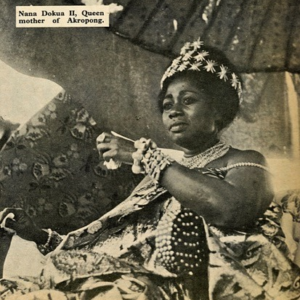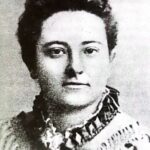
NANA DOKUA
Nana Dokua, or Dokuwa (17? -1855) was queen of Akyem Abuakwa, an Akan state in what is now southern Ghana, from about 1817 till the late 1830s. During this time she won fame as a warrior, an administrator, and a progressive ruler.
Her mother, Akoto, was the daughter of Adu Darko, chief of Asamankesi, and she herself was grandniece of Ofori Panin (q.v.), ruler of the Akyem Abuakwa in the early years of the 18th century. Nana Dokua developed the asafo (warrior bands) as a popular and effective method of mobilising warriors to defend both Kyebi, the state capital, and the entire state. As a shield against sudden invasions of Kyebi, she strengthened the asafo of Apapam, Apedwa, and Tete, villages which were situated only a few miles from Kyebi, and which commanded the three main pathways to the capital. They became institutionalised as the state asafo, or Amantoomiensa ( asafo of the three villages ).
In 1822, Nana Dokua accepted the advice of the Amantoomiensa to renounce her ties with Asante. She joined the coalition of coastal states which was subsequently formed against Asante, and exhibited rare courage when she led the Akyem Abuakwa forces against the Asante in person at the battle of Katamanso ( Akantanmansu ) in 1826. The victory of the coalition over Asante in this raised Nana Dokua’s prestige very high, as it ended Asante suzerainty over Akyem Abuakwa and the coastal states.
Nana Dokua’s successful defiance of Asante power made her state an asylum for political dissidents from Asante, which was to the northwest. Even before 1826 there were hundreds of Asante refugees living in Akyem. Early in the 1820s, the Bosome sought refuge from the Asante in Akyem Abuakwa. Nana Dokua assigned them lands in the western extremity of the state, where they laid the foundations of the modern Akyem Bosome state.
In 1824 the Bosome had been followed by the Kotoku, also fleeing from the Asante. The Kotoku refugees, led by Afrifa Akwada who ruled in about 1824-1825, were welcomed by Nana Dokua at Ohia ( probably Kyea [Chia], an Abuakwa town in Akyem Kotoku, east of Brenase near the Pra River), and were offered a choice of places to settle . They chose Gyadam, north of Kyebi, which then became the capital of the Akyem Kotoku state till 1860. In 1832 Dokua also offered her state as a refuge to the family of Dwaben, northeast of the Asante capital Kumase, who had fled as a result of a civil war between Kumase and Dwaben. The Dwaben royal family, headed by Kwaku Boaten, then lived in Akyem Abuakwa until 1839, the year of Boaten’s death, when it was persuaded to return to Asante after the settlement of its dispute with Asantehene.
In the late 1830s, Nana Dokua abdicated in favour of the elder of her twin sons, named Ata Panin. She nevertheless continued to exercise a powerful influence over affairs of state till her death in 1855.
R. ADDO-FENING


